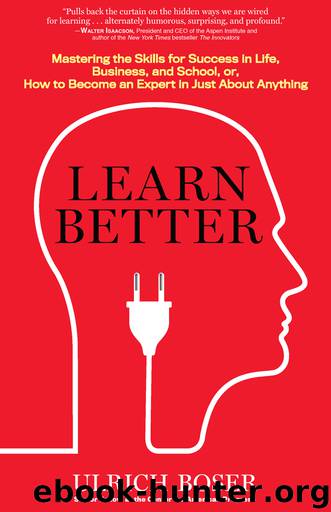Learn Better by Ulrich Boser

Author:Ulrich Boser
Language: eng
Format: epub
Publisher: Rodale
Published: 2017-08-28T04:00:00+00:00
The Value of Uncertainty
In this chapter so far, we’ve come across a number of artists. Some of them are well-known like Jackson Pollock and Miles Davis. Others like Richard Feynman simply travel in creative fields. For still others, art is a hobby. The fractal scientist Richard Taylor is an amateur painter. Helen Harrison of the Pollock museum studied sculpture for years.
This isn’t a bizarre stroke of chance. Expanding an area of knowledge requires a type of creativity. We need to feel at home with nuance and uncertainty, and in fact, research shows that people will learn more if they believe that an area of expertise is tentative, ambiguous, something that they can discover and explore.
All in all, we probably should have addressed this issue earlier. It’s hard to expand any sort of skill without the expectation that you can expand it. If you believe learning is just a matter of collecting information, of developing steadfast procedures, there’s no reason to flesh out mastery in deeper ways.
Plus, knowledge is uncertain by definition, and just about every area of expertise has tentative ideas, subtle nuances, fresh areas waiting for discovery. This idea is self-evident, at least for experts. If you’re an authority in a field, ambiguity is a given. Expertise is always changing. In science, top researchers are constantly building up new areas of knowledge—just look at the constant churn of journal headlines. In literature, every week, it seems, another analysis of the Great American Novel hits the already overladen bookshelves.
But even the most basic math problems are really not that different. They can exhibit mind-stretching complexity, offering all sorts of room for ambiguity. Consider adding 75 to 962. At first glance, it’s remarkably basic. But consider that there are—literally—more than a thousand different ways to solve the question, none of them any more correct than any of the others.
This approach is more than a way to mastery. It’s an actual goal, as physics educator Andrew Elby told me. After all, we learn areas of expertise as a way to grapple with the world, to understand complexity, to shift our patterns of thought. This is true for well-known experts— and raw beginners. “Learning is about reasoning and explanation, not just right answers,” Elby told me.
More than that, this idea also reflects the world that we live in, and the Knowledge Economy has become the Thinking Economy. In other words, we need more subtle forms of knowledge in order to succeed, and even academic areas that might seem rote just aren’t that rote anymore.
Take the military. There was a time not a long ago when the armed services were all about learning the rules, following orders, and executing commands. The United States won World War II in exactly this manner: Five-star generals ordered massive amounts of men onto the shores of Belgium to battle their way to Berlin.
But the military is changing because the world is changing, and the United States is never going to win a war in the same way that it won World War II.
Download
This site does not store any files on its server. We only index and link to content provided by other sites. Please contact the content providers to delete copyright contents if any and email us, we'll remove relevant links or contents immediately.
A Mind For Numbers: How to Excel at Math and Science (Even If You Flunked Algebra) by Barbara Oakley(3307)
Limitless by Jim Kwik(3175)
Fluent Forever: How to Learn Any Language Fast and Never Forget It by Gabriel Wyner(3083)
The Marketing Plan Handbook: Develop Big-Picture Marketing Plans for Pennies on the Dollar by Robert W. Bly(3062)
Remember It! by Nelson Dellis(2769)
The Mind Map Book by Tony Buzan(2576)
Memory Rescue by Daniel G. Amen(2422)
The Memory Code by Lynne Kelly(2401)
Super Reading Secrets by Howard Stephen Berg(2045)
Boost Your Brain Power in 60 Seconds by Michelle Schoffro Cook(1990)
Memory Rescue: Supercharge Your Brain, Reverse Memory Loss, and Remember What Matters Most by Amen Dr. Daniel G(1979)
Brain Training: How To Learn and Remember Everything (Neuro Linguistic Programming, Remember Everything, Increase memory, How To Remember Book 1) by Lynch George(1873)
How We Learn: The Surprising Truth About When, Where, and Why It Happens by Carey Benedict(1799)
You Can Have an Amazing Memory by Dominic O'Brien(1798)
The Mechanism of Mind: Understand how your mind works to maximise memory and creative potential by Edward de Bono(1771)
The Old Farmer's Almanac 2020 by Old Farmer’s Almanac(1731)
The Brain Boost Diet Plan by Christine Bailey(1662)
How to Develop a Perfect Memory by Dominic O'Brien(1610)
Master Your Memory by Ron Fry(1543)
